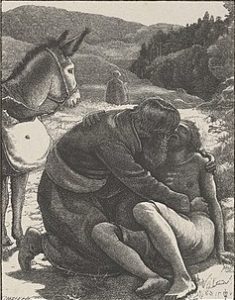Unless your righteousness goes beyond that of the experts in the law and the Pharisees, you will never enter the kingdom of heaven. (Matthew 5:20)

In the Sermon on the Mount in Matthew 5, we find some of Jesus’ most challenging teachings. He said that those who do and teach others to do even the least of God’s commands will be called “great” in his kingdom. He speaks about having “righteousness surpassing that of the scribes and Pharisees,” and then he tightens many laws, comparing lust to adultery, and anger to murder, etc. He then makes extreme statements about cutting off your hand if it causes you to sin, and concludes with words about aiming to be perfect, like God himself.
These words of Jesus are a struggle for many of us. One traditional approach to dealing with them is to say that Jesus was actually showing how impossible it is to earn our way to heaven, to cause us to ask for salvation by grace instead. However, it’s hard to believe that Jesus was setting up impossible standards simply to discourage people from keeping them. Jesus challenged his disciples to live according to his teachings, and he did so himself. Understanding his Jewish context better will allow us to unravel several “knots” in this passage.
First of all, it is important to understand that “entering the kingdom of Heaven” is not synonymous with “going to heaven when you die.” The phrase “kingdom of Heaven,” malkhut shemayim, (mal-KHOOT sha-MA-yeem) is synonymous with “kingdom of God,” and it refers to God’s redemptive reign on earth right now. To “enter” or to “receive” his kingdom was to enthrone God as your king, committing yourself to be a part of God’s “team” and to do his will.
Jesus’ references to the “kingdom of Heaven” in the Sermon on the Mount were really about how to aim to do God’s will as members of his kingdom, not how to earn your way to heaven.1 Our salvation is based on Jesus’ atonement for our sins, not on “earning our way.”
The Idea of Hasidut
Jesus may have actually had an idea in mind that was in the culture at that time. He appears to be focusing on the idea of hasidut – (hah-see-DOOT), a rabbinic term which is often translated “piety.”2 It means to walk closely with God and be utterly obedient to him. A hasid (ha-SEED), a pious person, eagerly asks the question, “What more can I do to please you?”
The idea is that they don’t focus on the minimum requirements, but on going beyond the rules to serve God. An Orthodox Jewish source describes the idea of being a hasid this way:
The hasid is one who goes beyond the letter of the law in his service of G-d. He does not do only what he is told, but he looks for ways to fulfill G-d’s will. This requires intelligence and planning; one must anticipate just what G-d wants of him and how he can best use his own talents in service of his Creator. [This is] in direct contrast to mock-piety – fasting, wailing, rolling in the snow, etc…. G-d has no interest in senseless service – that we do things just because they’re hard (and get us a lot of notice). Piety is not doing things which hurt. It is careful, planned and responsible service of G-d. We are not to sacrifice ourselves for G-d with self-destructive acts of devotion; we are to *live* for Him.3
 The goal of most rabbis was to interpret God’s Torah (law, teaching or instruction) so that people could apply it to their lives and live within its limits; but if you think about it, laws can only define the very minimum required to not sin, they can’t legislate what you could do purely out of love. If this is Jesus’ thinking, it clarifies his words about “righteousness that surpasses that of the scribes and Pharisees…” (Mt 5:20). The phrase “scribes and Pharisees” may not be about them as people, but as the recognized interpreters of the law.
The goal of most rabbis was to interpret God’s Torah (law, teaching or instruction) so that people could apply it to their lives and live within its limits; but if you think about it, laws can only define the very minimum required to not sin, they can’t legislate what you could do purely out of love. If this is Jesus’ thinking, it clarifies his words about “righteousness that surpasses that of the scribes and Pharisees…” (Mt 5:20). The phrase “scribes and Pharisees” may not be about them as people, but as the recognized interpreters of the law.
One translation says, “Unless your righteousness goes beyond that of the experts in the law…” (New English Translation). You could read this as, “do more than what the finest interpreters of the law say you must do.” Then the passage isn’t about being stricter than the strictest, but about seeking to do God’s will beyond its official interpretation. Jesus was not saying, “sit back and enjoy your free ride to heaven,” but exactly the opposite — “if God is really your king, you need to do your utmost to please him.”
Hasidut and the Sermon on the Mount
Understanding the idea of hasidut helps us see the overall message of the Sermon on the Mount, when Jesus points out various minimums set in the law, and then says to go beyond that. The law says “don’t kill” but you should not even stay angry. The law says, “don’t commit adultery” but you should not even lust.
The law says you can take vows in God’s name, but instead, you should be a person who has such integrity that your “yes” and “no” are just as good. Not only should you not seek revenge against your enemies, you should find ways to show them and everyone else the love of God. Loan people your money, carry their burdens. Anything!
Ultimately, the whole sermon is not so much about a list of toughened rules, but about exhorting us to change where our aim is. It is easy to look for what the minimum is so that you can just do that, but in every case Jesus is saying, “Don’t live by the minimum!” Don’t say to yourself, as long as I don’t commit adultery, it’s fine to lust. Don’t say that as long as I don’t kill someone, I can be furious with them. If you want to be a part of God’s redemptive kingdom on earth, don’t ask how little you can do, but ask how much you can do, to please your Father in heaven.
“Fear of Sin”
A central aspect of being a hasid in Jewish thinking was that one tried to walk intimately with God. To be close to God meant that you needed to do everything to keep sin out of your life. From this came the concept of yireh chet, (yeer-EH het) “fear of sin.” Here, “fear” doesn’t mean being terrified of punishment or of God’s anger. Rather, it is to be horrified by the idea of having sin disrupt your intimate walk with God.
As a result, a person who is a “sin-fearer” would do everything possible to keep it out of his or her life. Jesus’ strong words about cutting off your hand or plucking out your eye fit with this idea of “fearing sin.” Jesus had a great revulsion to sin because he realized what it did to break the relationship between God and man. He used hyperboles to motivate his listeners to avoid it at all costs.
A person who was aiming for hasidut set his own boundaries inside of the rules as others kept them, so that he didn’t come close to breaking the Law. A recent example is two ultra-orthodox leaders from Jerusalem who booked a flight to the US and bought all the seats in the first class section of a plane, requested only male flight attendants, and even taped over the TV monitors.4 They went to enormous expense to avoid being tempted by sin.
The Danger of Trying to Be a Hasid
Throughout the centuries there have been movements in Judaism and in Christianity that have tried to draw closer to God by becoming fastidious about observance and in keeping away from sin. While the goal is admirable, whenever a person tries to live this way there are many potential traps. One can easily become a legalist, or prideful, or hypocritical, or elitist. In light of this, it is interesting to read the following quote:
There are seven kinds of Pharisees: the “shoulder” Pharisee, who ostentatiously carries his good deeds on his shoulder so all can see them; the “wait-a-moment” Pharisee, who wants you to wait while he performs a mitzvah (good deed); the bruised Pharisee, who runs into a wall while looking at the ground to avoid seeing a woman; the “reckoning” Pharisee, who commits a sin, then does a good deed and balances the one against the other; the “pestle” Pharisee, whose head is bowed in false humility, like a pestle in a mortar; the Pharisee who asks, “What is my duty, so that I may do it?” as if he thought he had fulfilled every obligation already; the Pharisee from fear, like Job; and the Pharisee from love, like Abraham.5
Many recognize how similar this passage is to Jesus’ “woes” of Matthew 23. It might surprise Christians that the Pharisaic movement practiced its own self-criticism and noted the same kinds of errors that Jesus did. More than one scholar has pointed out that Jesus’ statements might be like the “seven kinds” saying in another way.
Instead of accusing every person of all of the sins that he speaks of, they assert that each “woe” is pointed at only the people who are falling into those sins. Instead of the blanket statement, “Woe to all of you — you’re all greedy, legalistic, and hypocritical!” he was saying something like, “Woe to you who are greedy, and woe to you who are legalistic, and you who are hypocritical!” Rather than condemning the whole group, he may have been pointing out the errors, just as the other rabbis did.6
It’s easy for us to read these passages about the seven types of Pharisees smugly, as if only the foolish Pharisees could ever have fallen into these problems. Instead, we should see them as wise words to anyone who is passionate about trying to live as God intended. There are so many ways to go wrong — by slipping into pride, or legalism, or by becoming hypocritical.
The answer is not to just give up and be worldly. The rabbis have an excellent insight that sounds like Jesus may have been saying the same thing. They point out that of all of the types of Pharisees, the only one that is truly commendable is the one that serves entirely out of love. One rabbi says it this way:
To serve with love does not mean just following the Torah and commandments, and not walking in the path of wisdom because of other reasons: to avoid bad consequences, and to be rewarded. Rather, it is doing the right thing because it is right, and in the end good comes because of it. This quality is very great and not every wise man attained it. This is the rank of our father Abraham whom the Holy blessed One has called “my lover” [Is. 41:8] because he served only for the sake of love. The Holy blessed One has commanded this virtue through Moshe as it is said: “You shall love Hashem your God.” When one loves God with proper love, automatically one performs all commandments with love.7
This fits completely with Jesus’ statement that all the commands can be summarized by “Love the Lord your God,” and even quotes that same verse. It seems that Jesus and later rabbis both saw that when you are obeying God purely out of love for him, you are eager to go beyond the minimum. When your love for God motivates you to keep from things that tempt you into sin, you can set up boundaries without becoming arrogant or legalistic about them.
Hasidut: The True Goal of Discipleship
This sermon of Jesus is difficult, but it is his goal for us as his disciples. No one is capable of doing this when they first believe, but we can aim to be a little more like this every day of our lives.
In some churches we don’t hear much of this message because Jesus’ great commission to “raise up disciples of all nations” has been interpreted as only meaning, “share the gospel with the lost.” Then the emphasis is on how easy it is to receive the free gift of salvation, and the only thing that we teach after that is how to evangelize others.
A disciple is much more than a mere convert, however, and believing in Christ is not God’s supreme goal for us — it is only the beginning of a life of walking ever closer to him. To go no deeper than “accepting Christ” is to be like the seed that fell on the rock or in the thorns — it sprouted, but bore little or no fruit (Lk 8:4-15). As critical as it is to share the message of Christ with the world, Jesus’ challenge to us is to always seek to go higher and deeper in our love and service to him.
~~~~
 To explore this topic more, see chapter 12, “Jesus and the Torah” in Sitting at the Feet of Rabbi Jesus, Zondervan, 2009, p. 163-179.
To explore this topic more, see chapter 12, “Jesus and the Torah” in Sitting at the Feet of Rabbi Jesus, Zondervan, 2009, p. 163-179.
1 See the article “What Is the Kingdom of Heaven.”
2 Many points in this article are based on the talk “Jesus, the Sin-Fearer,” by David Pileggi, which was given at the Insights into Jesus of Nazareth Seminar, which is available at the link. Also, see “Jesus and the Hasidim” by Shmuel Safrai, at www.jerusalemperspective.com.
3 Rabbi David Rosenfeld, Pirke Avot, Mishnahs 10-11 at torah.org, adapted.
4 Story from Dwight Pryor, as quoted by David Pileggi in “Jesus, the Sin-Fearer.” See footnote above.
5 Babylonian Talmud (supplement), Avot de R. Nathan 37.4.
6 David Stern, Jewish New Testament Commentary, (Clarksville, MD: Jewish New Testament Publications, 1992) p. 69. Also, Menachem Mansoor, Encyclopedia Judaica, (Jerusalem: Macmillan and Keter, 1972) 13:366.
7 Rebbi Moshe ben Mimoun, “Hasiduth: Love and Av’oda” The word “Hashem” means “the name” in Hebrew and substitutes for God’s name, as does the phrase “the Holy Blessed One.” This is done out of reverence, so that the name of God is not used irreverently and thereby profaned. This is also the rationale behind spelling “God” with a dash in the middle, and also Jesus’ use of the phrase “kingdom of Heaven” where “Heaven” is an indirect reference to God. This is actually an illustration of “fear of sin” – going out of one’s way to avoid doing wrong. For more on the Jewish traditions regarding the name of God, See New Light on the Difficult Words of Jesus by David Bivin (En-Gedi, Holland, MI, 2005), pp. 55-58.
Photos: Макаров [Public domain]

 At some point when we have been offended, we need to realize that if we are sinners ourselves, then we can’t demand judgment on others. We need to put aside judgment and extend mercy instead. As Jesus said, “Be merciful, just as your Father is merciful. Do not judge, and you will not be judged. Do not condemn, and you will not be condemned. Forgive, and you will be forgiven… For with the measure you use, it will be measured out to you.” (Luke 6:35-38)
At some point when we have been offended, we need to realize that if we are sinners ourselves, then we can’t demand judgment on others. We need to put aside judgment and extend mercy instead. As Jesus said, “Be merciful, just as your Father is merciful. Do not judge, and you will not be judged. Do not condemn, and you will not be condemned. Forgive, and you will be forgiven… For with the measure you use, it will be measured out to you.” (Luke 6:35-38)

 A rabbi who lived more than a hundred years before Jesus said, “Judge everyone with the scales weighted in their favor” (Yehoshua ben Perechia, Avot 1:6). In a later source, the Babylonian Talmud, it says “He who judges his neighbor favorably will be judged favorably by God” (Shabbat 127a).
A rabbi who lived more than a hundred years before Jesus said, “Judge everyone with the scales weighted in their favor” (Yehoshua ben Perechia, Avot 1:6). In a later source, the Babylonian Talmud, it says “He who judges his neighbor favorably will be judged favorably by God” (Shabbat 127a). What would happen if each group stopped assigning negative motivations to the other group? What if the “hymns only” group started saying, “Maybe the younger members of our church think that they can bring new meaning to the service by putting it in their own style…”
What would happen if each group stopped assigning negative motivations to the other group? What if the “hymns only” group started saying, “Maybe the younger members of our church think that they can bring new meaning to the service by putting it in their own style…”

 Jesus also alluded to the rigors of the peripatetic life of a sage when he said, “Foxes have holes and birds of the air have nests, but the Son of Man has nowhere to lay his head” (Luke 9:57-58). The burden Jesus’ disciples had to bear was a heavy one, but not unlike what disciples of other first-century sages had to bear, and would not have been considered extreme by the standards of first-century Jewish society.
Jesus also alluded to the rigors of the peripatetic life of a sage when he said, “Foxes have holes and birds of the air have nests, but the Son of Man has nowhere to lay his head” (Luke 9:57-58). The burden Jesus’ disciples had to bear was a heavy one, but not unlike what disciples of other first-century sages had to bear, and would not have been considered extreme by the standards of first-century Jewish society.








 God therefore gained glory when Israel won battles against nations that worshiped false gods.1 A major theme of the Old Testament was how God was using this logic to convince Israel and all other nations that he was the supreme God. They believed that God’s intention was to enlarge his nation and to purify their hearts so that he would have a great kingdom of whole-hearted worshippers.
God therefore gained glory when Israel won battles against nations that worshiped false gods.1 A major theme of the Old Testament was how God was using this logic to convince Israel and all other nations that he was the supreme God. They believed that God’s intention was to enlarge his nation and to purify their hearts so that he would have a great kingdom of whole-hearted worshippers. When he told his disciples to proclaim that God’s “kingdom was at hand,” it meant that he, God’s true King had arrived on earth. Jesus’ mission was to establish and reign over God’s kingdom, and he often spoke in these terms.4
When he told his disciples to proclaim that God’s “kingdom was at hand,” it meant that he, God’s true King had arrived on earth. Jesus’ mission was to establish and reign over God’s kingdom, and he often spoke in these terms.4





